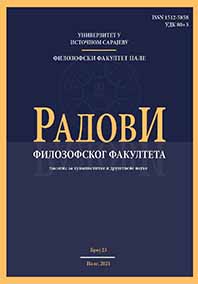НИЧЕ: ТРАГИЧНА ИГРА И АФИРМАЦИЈА ЖИВОТА
NIETSCZHE: TRAGIC PLAY AND THE AFFIRMATION OF LIFE
Author(s): Danijela MilinkovićSubject(s): Philosophy, Aesthetics, 19th Century Philosophy, Ontology
Published by: Универзитет у Источном Сарајеву, Филозофски факултет Пале
Keywords: tragedy; the Apollonian concept; the Dionysian concept; music; choir; freedom; art; Socratic philosophy;
Summary/Abstract: Nietzsche was a philosopher for whom affirmation of life and transvaluation of values were some of the main subjects of philosophy. According to him, life and existence could only be seen through the art, precisely through tragedy as a poetic form. Inspired by Greek philosophy and poetry, he pointed out that the power of life can be manifested on the basis of two forces or two concepts which guide us through life. These are the Apollonian and the Dionysian concept. For the most part, Nietzsche did not affirm the Apollonian concept, which was the concept of order, harmony and strictness; he preferred the Dionysian concept, which conveys the fullness of life and freedom, both generally and in art. For Nietzsche, the Apollonian concept was not good enough to help him in his intention to affirm life through art. He turned towards the world of drunkenness that is actually the motto of the Dionysian concept. According to Nietzsche, a state of drunkenness is, in fact, a state of joy, excitement, which makes a man act. This drunkenness is a state which he called the aesthetic state of man, where the strength and fullness of life increase. The state of drunkenness should not be understood either as something negative or excessive, but as an ability of an artist to go beyond himself and his capabilities. The state of drunkenness cannot be temporary, and as such it cannot be considered an impulse but a passion that leads the artist through life and creation. In this world of drunkenness, as Nietzsche sees it, man becomes the central category to which the alienated nature returns to and tries to embrace him again as its own creation. In the Dionysian concept, man is released from the law, and as such he is able to reconcile himself with his loved ones again, without the veil of Maya being an obstacle to that union. Dionysus is the only god in Hellenic mythology that represents a tragic figure of a suffering god. However, although the basis of the Dionysian concept is tragic, Dionysus eventually succeeds in overcoming pain and suffering and thus affirms the joy of life. Nevertheless, although the Dionysian concept performed against the Apollonian concept and attempted to overthrow its rule of illusion and rigidity, according to Nietzsche, the Apollonian principle survived, as one that was like some kind of war camp, as a fortress-protected art.
Journal: Радови Филозофског факултета (часопис за хуманистичке и друштвене науке)
- Issue Year: 2021
- Issue No: 23
- Page Range: 121-140
- Page Count: 20
- Language: Serbian

